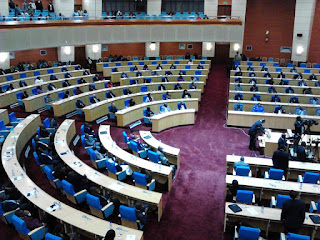 |
| Hilda Mkandawire: MRA |
Business people in the country have been asked to join forces with Malawi Revenue Authority (MRA) in the fight against corruption in country's borders.
The call was made over the weekend during the meeting organised by the Small and Medium Enterprise Association (SMEA)-Lilongwe chapter on issues about tax.
SMEA members raised alarm on incessant corrupt practices among some MRA officers who often ask for bribes from business persons if they want to have their goods cleared at boarders in good time.
"Most officers delay processes and can't help without us pay them something" reported one of the participants in the meeting
Responding to this problem, Hilda Mkandawire, the Public Relations Specialist at MRA pleaded with participants and all business persons in the country not to tolerate this unbecoming practice and encouraged every tax payer to report to MRA, any officer who may ask them to pay bribe.
"Don't give money to MRA officers as bribe. MRA does not condone corruption." She warned
"If our officers ask for bribes you should not accept this practice because an MRA officer is paid at the end of the month and please do not pay bribes for them to assist you. It is their job to assist you.” she emphasized
Mkandawire further cautioned that bribes are vices that haunt growth of businesses as significant part of profit is used to pay for the corrupt officers. She added that this further derail development as Government also fail to correct tax from struggling businesses.
"Please report them to us, and we will deal with it. Remember, without your businesses this country cannot prosper." She added
Other concerns raised by the business persons of which MRA has committed forward them to Management for consideration are bad attitude of officers when helping business persons, delays when clearing goods and interruptions at roadblocks among others.
“Most of them have requested us to have some privacy when they want to discuss their tax issues with MRA officers. We have promised them that we are taking up this request to management to look at this and see whether we can set up some interview rooms in our stations. It is true that when somebody has an issue you wouldn’t want to discuss an issue where there are a lot of people. But this is something that needs to be taken to the management and we will see how management will handle that one.” said Mkandawire later in an interview
“But, we ask all business persons to be compliant so that whenever they pass through the borders they are not delayed. And they should always not avoid tax at boarders and this will even reduce their delays in roadblocks because many people do not declare all their goods at boarders so the roadblocks assists us to verify if the traders have paid tax for all their imported goods." She said
The meeting looked at all areas of domestic, customs and excise tax
One of the participants, Danny Zenengeya who trade as Double Options Investments said was satisfied with most answers from MRA. He said the meeting has helped him to understand reasons why some challenges were happening to him when importing goods and how he is going to avoid them.
"The meeting has been fruit full and we have been advised to report any matters of concern immediately to their offices and also that we have to follow the right channels and pay the tax” he said and urged MRA to improve on time frame issues because some delays in issuance of invoices and finalising some processes prevents him from meeting deadlines of delivering goods and attending to his business.
 |
| Jacob Chikoya |
Chairperson for Small and Medium Enterprise Association (SMEA) for Lilongwe chapter, Jacob Chikoya who works for Printers Systems said the group decided to invite MRA to enlighten them more on tax related matters because most of the businesses encounter a lot of challenges with MRA officers.
“In other words we would like to be more tax compliance without being penalized as it is the case right now.” he said, then added; “We are very satisfied with their response but listening to them presenting what tax is all about is not a big problem but the problem is only that the officers on the ground they make it difficult for us."
Chikoya has also urged fellow business persons to work together in order to have a better force when negotiating to Government and other enforcement agencies, various issues haunting their businesses.
“We also like to invite all the business people to come forward and join SMEA because we understand that if you have one voice and talking to Government and all other relevant authorities, we can achieve more” pleaded Jacob Chikoya













